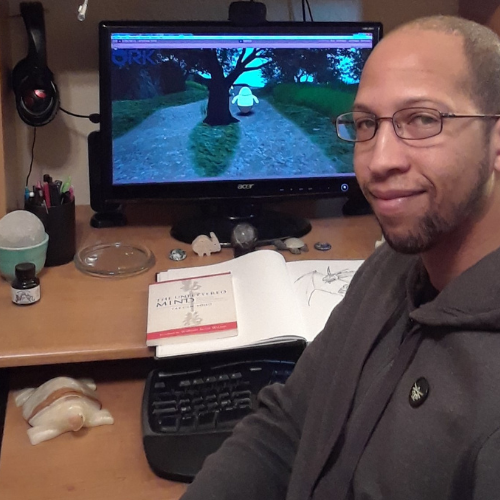Welcome to our next Student Spotlight in our year-long series on College of Marin’s (COM) Umoja program.
Join us in 2021 as we explore how COM’s Umoja program empowers students, promotes unity, and builds community and equity.
 Student Spotlight: Dawud Anderson-Zafir
Student Spotlight: Dawud Anderson-Zafir
Dawud Anderson-Zafir was born and raised in Richmond, California, and when he was around 13 years old he and his family moved to Walnut Creek.
At 16, he wanted to follow in his friend who dropped out of high school and got a GED and went straight into college. His parents wanted him to get a high school diploma and insisted he stay in high school.
“I kind of lost my momentum after that, along with my flavor for at least the high school education system,” recalls Dawud. “In my senior year, some friends and I decided to start a video game company. I decided to go to Diablo Valley College, but there wasn’t a specific program path for game development at the time. So, I took a business class, Japanese and American Sign Language classes, and some martial arts classes. Ultimately, I didn’t feel like I could do what I wanted to do there, and I left.”
Eventually, he decided to try to teach himself how to make video games, but he discovered he mentally couldn’t wrap his head around creating things in three-dimensional modeling software. “It was the hardest thing I have ever done,” Dawud remembers. “The software just blew my mind. I didn’t even know where to begin. Even the tutorials left me confused.”
At this point in his life, Dawud had two children and his ex-wife decided to move out-of-state with them. He decided this was the perfect opportunity to go back to college. In 2017, he decided to go to College of Marin because they had a 3D modeling course. It was then he discovered the college had an entire multimedia program which was exactly what he wanted. That’s when he decided to get his degree and begin his lifelong dream, starting a game development company.
Being an older college student, Dawud already had experience starting an independent publishing company and assisted with starting another business. He had also been in a college environment before and knew how he wanted to approach his next experience differently.
“I felt I had done college wrong before,” recalls Dawud. “I had never gotten involved in seeking out counseling and I was winging it on my own. Since that didn’t work, I decided to do a total 180 and get involved in every step to try to understand the system. I went through the whole orientation and registration and found some useful information. I even said to enrollment services, ‘I don’t make that much money. I’m working. I’m a part-time single parent. What’s available to me?’ The first thing they said was to look into EOPS. EOPS had me sign up with an EOPS Counselor. That’s where I met Rinetta Early. Not only is she a great counselor, she said, ‘you need to be in Umoja.’ She told me about it. I went to Umoja and talked to a couple of people.”
After going to the Counseling Office a couple of times, he noticed a line of Black men waiting for Umoja Counselor Troy Stevenson. He asked someone in line about Stevenson who recommended Dawud see him. Dawud did and discovered Stevenson was also a part of Umoja. Stevenson helped Dawud make sure he was on the right path with what Dawud wanted to do in getting him set to start his own gaming development business.
Before attending COM, Dawud worked in Marin at a local grocery store where he first met COM Umoja faculty Walter Turner through a friend. He found out Turner taught history and Dawud said he looked forward to one day taking a class with Turner.
Fast forward, and Dawud chose to take History of African Americans at COM. He thought it would be an easy A because he grew up with Dr. Fatima Ali, a mentor who was head of education for the Nation of Islam and worked under Louis Farrakan, Elijah Muhammad and Malcolm X. When he saw Walter Turner walk in the classroom, he was suddenly thrilled.
“I immediately got so excited,” says Dawud. “I said, ‘oh, this is going to be a great class!’ In that first day, Mr. Turner talked about Umoja and that’s where I first heard about it. That was my first class my first day back at college, and I was super excited. I went to the Umoja space called the Village and the first thing I attended was a session called Chop It Up where we would just talk about different issues that were facing African Americans and within the African American community.”
Dawud changed the goals he wanted to pursue a couple of times because of discovering new opportunities in college. “At first I was trying to get an associate degree and take as many multimedia classes as possible. But because of Umoja, I decided I wanted to go further with my education. My next plan was to take this year and go to a private university for astrophysics and aerospace engineering.”
He had attended an Umoja statewide conference in southern California in fall 2018, and the keynote speaker, Eric Thomas, changed his life. “He said to the audience, ‘stand up if you have your bachelors’ and a ton of people stood up,” remembers Dawud. “Mind you, this is a crowd of 90 percent or more Black people, and this is the first time I ever saw this in my life. ‘Stand up if you have your masters.’ Not as many, but a good amount of people stood up. Then he said, ‘stand up if you have your doctorate,’ and the amount of people standing in that room astounded me. It was well over twenty. I had no idea I was at the table with or next to or had been talking to earlier that day people with their PhD. Suddenly, the light went on that a lifelong dream could be realized. I could get a PhD in astrophysics.”
He had already taught himself the basics of quantum physics to understand what he was reading around developing a warp drive and a sustainable way to create artificial gravity to make living in space a reality. When Dawud answered the question, what do you want to be when you grow up, “I told my mom, I want to be a scientist, an inventor, an astronaut, and an athlete which is a testament to the fact I never do anything small.”
His plans shifted again when an internship requirement for his multimedia degree changed to independent study which would allow him to further develop his game development company. He realized this was the time to move his idea forward and jumped into developing it. His team and company grew. He decided to pivot once more and commit to game development a week before the semester started.
“It has been the craziest, most difficult semester that I’ve ever had to do; it was a complete 180. It’s been really difficult, but I will say that my Umoja professors have actually been some of the greatest assets to me, as well. I have talked about stopping school, dropping all my classes, not transferring, and just doing my business. Walter Turner holds a special place for me. I have immense amount of respect for his counsel. When I first mentioned that to him. I said, I’m thinking about just dropping. And he said, ‘nope. I’m not going to let you.’ I told another professor, Dr. Yashica Crawford, who is also a part of Umoja faculty and who I had a class with, ‘well, I talked to Walter, and now I’m talking to you about dropping.’ And she said, ‘no, 300%. I’m not letting you drop.’ I was like, ‘okay.’”
“Now I have to finish my education which is a great thing.”
Read our first story on Umoja.
Discover how the Umoja Community can help you succeed at marin.edu/umoja.
To support the COM Umoja program, please donate. All donations go directly to the program and student scholarships and are tax-deductible.
